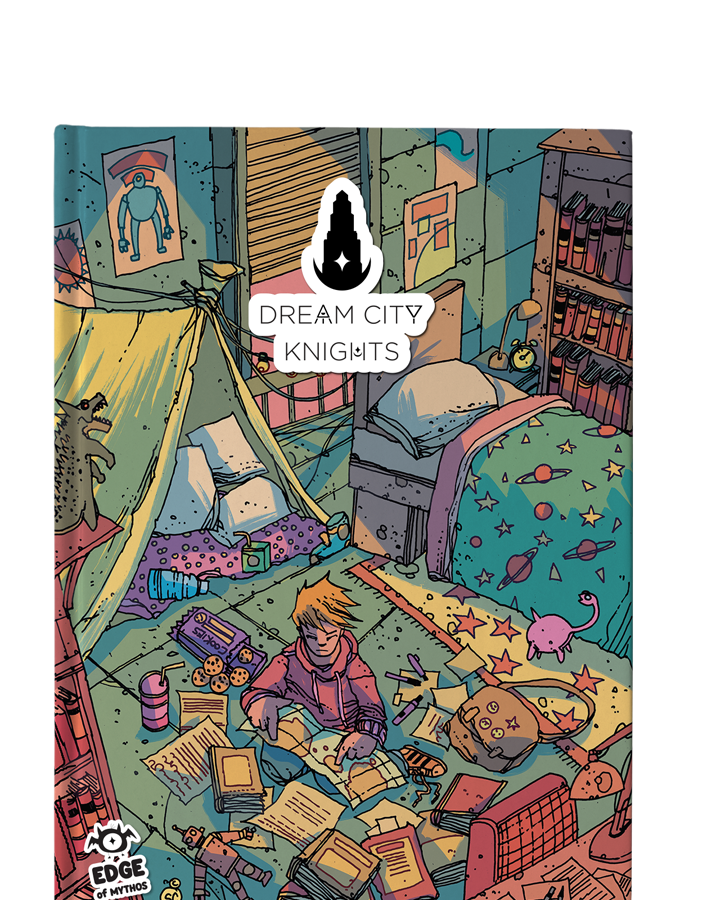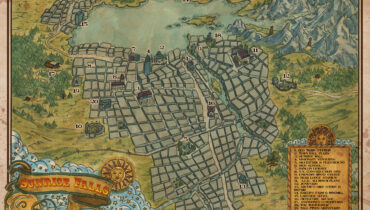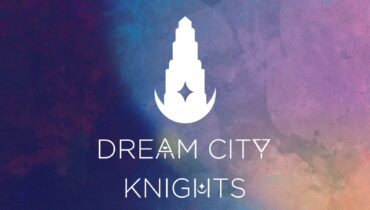The Duality System & Tippers
by Alexandros Papadakis
The Initial Idea
A game taking place in two separate realities requires mechanics that will be able to express the differing nature of those realities. The system of Dream City Knights, the rather aptly named Duality System, came to be following a discussion with my friend John Papadakis who was working on a TTRPG involving dream detectives; the discussion focused on the ways dream detectives should balance and distribute their power between the worlds. The idea then was to have different stats that the player would have to balance in order to be effective.
For a setting to encapsulate the notion of the duality of the dice roll, a game with two distinct worlds would be required. Being strong in one world, would hinder your powers on the other, and, thus, the setting for Dream City Knights was born, and with it the need for players to travel between the world of the Waking and the world of the Dreaming.
Of course, RPG Lasers & Feelings by John Harper already existed, and used a similar resolution mechanic, albeit in a form simple enough to employ a roll-over/roll-under system. So, inspiration taken, we decided to take the dual statistic logic a step further.

The main roll
In the Duality System, each character has three main statistics called Focuses. During character creation players set the Base for every Focus, effectively choosing a number between 2 and 7. Success is determined by rolling a d8 for the statistic and comparing it to the Base score, keeping in mind that the goal of rolling over or under said score is determined by the world the character is currently traversing. This way, a Focus that is too strong in one world, will be extremely weak in the other.
The decision to use a d8 has so far proven efficient, and satisfying. Using a d6 felt very restrictive, and we wanted to move away from the d10 as way too many systems seem to be using it. The idea of using a d12 for the final game hasn’t been completely ruled out yet.
In order to do something in the worlds of Dream City Knights, a player needs to perform an Action, which will be explained in future posts.

For example: David is currently in the Dreaming trying to hide from a group of the Tower’s Agents, thus performing the Action “Cloak and Dagger”. The difficulty margin for this is 0, so he only has to consider his base of Ego. Since he is in the Dreaming, he has to roll over his Base of Ego, which is 3.
He rolls a 5 on the d8 which is more than enough to safely hide from the Tower’s Agents.
Tippers
The biggest challenge that came with such a system was the implementation of bonuses and penalties. How do you provide a clear explanation of a plus or a minus at a roll, when sometimes you need to roll higher than the Base and sometimes lower? This is where the Tipper comes in.
A positive Tipper is something the player can use to tip the dice by 1, thus a 4 can become a 3 or a 5. A negative Tipper is something the GM will use to hinder the player’s roll. When both the player and the GM want to use tippers in a roll, the GM first applies theirs, and then the player can decide to apply their own Tipper.
Tippers could be anything appropriate to the situation: positive/negative circumstances, a useful talent the player owns, a special ability or effect given by an adversary or a friend. It is a tool for both the GM and the players to keep the narrative interesting, and move the story forward in a lean manner.
There are three specific types of Tippers:
- Situational Tippers
Any situation that’s advantageous to the players gives them Tippers. These Tippers can have a value of 1 to 3 and can only change the roll that’s tied to the advantageous situation.
- 1 Tipper: Whenever the player is in a situation relatively advantageous to them, or whenever they are relatively well prepared/equipped.
- 2 Tippers: Whenever the player is in a very advantageous situation or whenever they are fully prepared/equipped.
- 3 Tippers: Whenever the player has done something amazing.
- Interest Tipper
These are the player’s Interests and can be used to help any Action the player takes that’s relevant to that particular Interest, given that the Keymaster agrees. When a player makes use of an Interest Tipper, they can tip their die as many times as the number of uses they want to/can spend from the Interest they’re using. A player cannot use multiple Interests to help the same Action.
- Keymaster Tippers
Keymasters are encouraged to reward their players’ behavior with Tippers. If a player gives a nice description of something they want to do, wants to do something that gets the whole table interested, tries to do something that will contribute significantly to the story or the feeling of the table, or generally wants to do something interesting for the game, the Keymaster may reward them with 1-3 Tippers.
Is that all?
Not really, but those are the fundamental pillars of the Duality System. There are several other additions and rules, but these will be discussed in a future post.
To actually see how our system plays, you can always download the FREE Quick-start Guide and try Dream City Knights for yourselves: https://edgeofmythos.com/portfolio/dream-city-knights/

Dream City Knights is coming to Kickstarter on May 15.
Visit our pre-launch page today and follow us to get notified first and grab our early-bird rewards: https://www.kickstarter.com/projects/edge-of-mythos/dream-city-knights-a-tabletop-rpg

